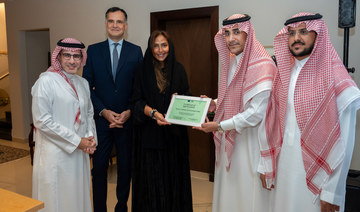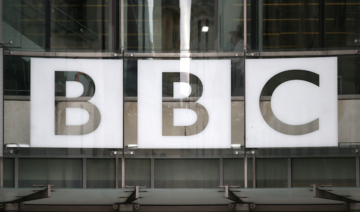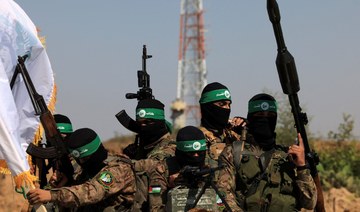NAIROBI: On the verge of tears, Nathan Nkunzimana recalled watching a video of a child being molested and another of a woman being killed.
Eight hours a day, his job as a content moderator for a Facebook contractor required him to look at horrors so the world wouldn’t have to. Some overwhelmed colleagues would scream or cry, he said.
Now, Nkunzimana is among nearly 200 former employees in Kenya who are suing Facebook and local contractor Sama over working conditions that could have implications for social media moderators around the world. It is the first known court challenge outside the United States, where Facebook settled with moderators in 2020.
The group was employed at the social media giant’s outsourced hub for content moderation in Kenya’s capital of Nairobi, where workers screen posts, videos, messages and other content from users across Africa, removing any illegal or harmful material that breaches its community standards and terms of service.
The moderators from several African countries are seeking a $1.6 billion compensation fund after alleging poor working conditions, including insufficient mental health support and low pay. Earlier this year, they were laid off by Sama as it left the business of content moderation. They assert that the companies are ignoring a court order for their contracts to be extended until the case is resolved.
Facebook and Sama have defended their employment practices.
With little certainty of how long the case will take to conclude, the moderators expressed despair as money and work permits run out and they wrestle with the traumatic images that haunt them.
“If you feel comfortable browsing and going through the Facebook page, it is because there’s someone like me who has been there on that screen, checking, ‘Is this okay to be here?’” Nkunzimana, a father of three from Burundi, told The Associated Press in Nairobi.
The 33-year-old said content moderation is like “soldiers” taking a bullet for Facebook users, with workers watching harmful content showing killing, suicide and sexual assault and making sure it is taken down.
For Nkunzimana and others, the job began with a sense of pride, feeling like they were “heroes to the community,” he said.
But as the exposure to alarming content reignited past traumas for some like him who had fled political or ethnic violence back home, the moderators found little support and a culture of secrecy.
They were asked to sign nondisclosure agreements. Personal items like phones were not allowed at work.
After his shift, Nkuzimana would go home exhausted and often locked himself in his bedroom to try to forget what he had seen. Even his wife had no idea what his job was like.
These days, he locks himself in his room to avoid his sons’ questions about why he’s no longer working and why they likely can no longer afford school fees. The salary for content moderators was $429 per month, with non-Kenyans getting a small expat allowance on top of that.
The Facebook contractor, US-based Sama, did little to ensure post-traumatic professional counseling was offered to moderators in its Nairobi office, Nkuzimana said. He said counselors were poorly trained to deal with what his colleagues were experiencing. Now, with no mental health care, he immerses himself in church instead.
Facebook parent Meta has said its contractors are contractually obliged to pay their employees above the industry standard in the markets they operate and provide on-site support by trained practitioners.
A spokesman said Meta could not comment on the Kenya case.
In an email to the AP, Sama said the salaries it offered in Kenya were four times the local minimum wage and that “over 60 percent of male employees and over 70 percent of female employees were living below the international poverty line (less than $1.90 a day)” before being hired.
Sama said all employees had unlimited access to one-on-one counseling “without fear of repercussions.” The contractor also called a recent court decision to extend the moderators’ contracts “confusing” and asserted that a later ruling pausing that decision means it has not gone into effect.
Such work has the potential to be “incredibly psychologically damaging,” but job-seekers in lower-income countries might take the risk in exchange for an office job in the tech industry, said Sarah Roberts, an expert in content moderation at the University of California, Los Angeles.
In countries like Kenya, where there is plenty of cheap labor available, the outsourcing of such sensitive work is “a story of an exploitative industry predicated on using global economic inequity to its advantage, doing harm and then taking no responsibility because the firms can be like, ‘Well, we never employed so-and-so, that was, you know, the third party,’” she said.
In addition, the mental health care provided might not be “the cream of the crop” and concerns have been raised about the confidentiality of therapy, said Roberts, an associate professor of information studies.
The difference in the Kenya court case, she said, is that the moderators are organizing and pushing back against their conditions, creating unusual visibility. The usual tactic in such cases in the US is to settle, she said, but “if cases are brought in other places, that might not be so easy for the companies to do that.”
Facebook invested in moderation hubs worldwide after being accused of allowing hate speech to circulate in countries like Ethiopia and Myanmar, where conflicts were killing thousands of people and harmful content was posted in a variety of local languages.
Sought for their fluency in various African languages, content moderators hired by Sama in Kenya soon found themselves looking at graphic content that hit painfully close to home.
The two years that Fasica Gebrekidan worked as a moderator roughly overlapped with the war in her native Ethiopia’s northern Tigray region, where hundreds of thousands of people were killed and many Tigrayans like her knew little about their loved ones’ fate.
Already suffering from having to flee the conflict, the 28-year-old spent her workday looking at “gruesome” videos and other content overwhelmingly related to the war, including rape. With videos, she had to watch the first 50 seconds and the last 50 seconds to reach a decision on whether it should be taken down.
The feeling of gratitude she’d had upon landing the job quickly disappeared.
“You run away from the war, then you have to see the war,” Fasica said. “It was just a torture for us.”
She now has no income and no permanent home. She said she would be looking for new opportunities if she could only feel normal again. A former journalist, she can’t bring herself to write anymore, even as an outlet for her emotions.
Fasica worries that “this garbage” will stay in her head forever. While speaking with the AP, she kept her eyes on a painting across the café, deep red with what appeared to be a man in distress. It bothered her.
Fasica blames Facebook for a lack of proper mental health care and pay and accuses the local contractor of using her and letting her go.
“Facebook should know what’s going on,” she said. “They should care about us.”
The fate of the moderators’ complaint lies with the Kenyan court, with the next hearing on July 10.
The uncertainty is frustrating, Fasica said. Some moderators are giving up and returning to their home countries, but that is not yet an option for her.
Facebook content moderators in Kenya call the work ‘torture.’ Their lawsuit may ripple worldwide
https://arab.news/4vsk8
Facebook content moderators in Kenya call the work ‘torture.’ Their lawsuit may ripple worldwide

- Moderators from several African countries are seeking a $1.6 billion compensation fund after alleging poor working conditions
BBC investigation leads to arrest of one of world’s most notorious people smugglers

- Barzan Majeed, nicknamed ‘Scorpion,’ is caught in Iraqi Kurdistan days after release of BBC podcast series by journalists who tracked him down and interviewed him
- Senior local official confirms officials used information from the broadcaster’s investigation to help find fugitive believed to have helped smuggle thousands of people to UK
DUBAI: Kurdish security forces arrested Barzan Majeed, described as one of the world’s most notorious people smugglers, in Iraqi Kurdistan on Sunday morning.
Nicknamed “Scorpion,” the fugitive is believed to have been involved in smuggling an estimated 10,000 people across the English Channel to the UK. He was arrested days after the release of a BBC podcast series in which investigative journalists tracked him down to the city of Sulaymaniyah in Iraq and interviewed him there.
During the interview, Majeed said he had lost count of the number of people he helped to smuggle, adding: “Maybe a thousand, maybe 10,000. I don’t know, I didn’t count.”
He admitted that between 2016 and 2019 he was one of two people who helped run a people-smuggling operation in Belgium and France but denied he was the mastermind of the operation.
“A couple of people, when they get arrested, they say, ‘We’re working for him’ — they want to get less (of a) sentence,” he said.
Originally from Iraq, Majeed moved to the city of Nottingham, in England, in 2013 but was deported two years later. He had been on the run since failing to appear at a court in Belgium for a sentencing hearing in November 2022.
The UK’s National Crime Agency issued a warrant for his arrest that same year. The agency, which confirmed his arrest, said: “We are grateful to the BBC for highlighting his case and remain determined to do all we can to disrupt and dismantle the criminal networks involved in smuggling people to the UK, wherever they operate.”
A senior member of the Kurdistan Regional Government confirmed its officials had used information from the BBC investigation to locate and arrest Majeed.
Each year, thousands of people flee Iraq, including its Kurdistan Region, in the hope of finding a better life in the UK or other parts of Europe. In many cases, they pay people smugglers to transport them, but the routes and methods used by the smugglers are often dangerous and the migrants face harsh weather and potentially deadly travel conditions.
Germany deported 222 Iraqi citizens in the first three months of this year as part of an alleged agreement between Berlin and Baghdad to deport migrants who do not qualify to remain in Germany, media organization Rudaw, which is based in Iraqi Kurdistan, reported this week.
Saudi radio station MBC FM marks 30 years of broadcasting with special events

- Bosses say the celebrations honor the pioneering station’s enduring contributions to the media landscape in the Kingdom
- ‘MBC FM has captured the ears and hearts of millions of Saudis over 3 decades’ and ‘continues to lead the radio airwaves with the love and loyalty of listeners,’ says group’s chairperson
LONDON: As pioneering Saudi radio station MBC FM celebrates three decades of broadcasting in the Kingdom, it is marking the milestone with a series of events and initiatives at the MBC Group headquarters in Riyadh under the theme “30 and Still Going Strong.”
The celebrations, which began on May 12, honor the station’s enduring contributions to Saudi Arabia’s media landscape, bosses said. They include competitions, entertainment events and exclusive interviews with renowned artists and stars from across the Gulf region and the wider Arab world.
“Just as MBC FM has captured the ears and hearts of millions of Saudis over three decades, being the first commercial FM radio station in the Kingdom, the radio and music sector at MBC Group today continues to lead the radio airwaves with the love and loyalty of listeners,” said Walid Al-Ibrahim, the chairperson of MBC Group.
In addition to providing entertainment for listeners, the station has served as a launchpad for emerging talent, he added, as he highlighted its influence on local culture.
Ziad Hamza, general manager of the radio and music Sector at MBC Group, said the station remains committed to its ongoing evolution while also honoring its strong history and legacy. In particular he highlighted investments in infrastructure, diversity of content and audience engagement as the station adapted to changing tastes and preferences among listeners.
“We have worked on developing the infrastructure and creating a comprehensive modern environment for the radio sector … by investing in Saudi youth talents, including radio presenters, producers, programmers and technicians,” said Hamza.
“We have also launched the MoodMBC application, which includes MBC FM, Panorama FM and MBC Podcast, in addition to enhanced options for direct communication, as well as rich and diverse content catering to poetry lovers, music session enthusiasts, and current affairs followers.
“Our goal has always been to strike a balance between the tastes of listeners and the needs of advertisers, facilitating our clients’ access to various target audience segments around the clock.”
Gulf news agencies discuss fake news, joint media strategy

- Meeting discussed plans for a collaborative media strategy for 2023-30
RIYADH: The threat of fake news and a program for personnel exchanges were among the topics discussed at the 23rd meeting of the heads of the news agencies of Gulf Cooperation Council countries on Monday.
The talks, held virtually, were chaired by Ahmed bin Saeed Al-Rumaihi, director-general of the Qatar News Agency, the Saudi Press Agency reported.
The meeting also discussed the decisions made during the 26th gathering of GCC Ministers of Media, most notably the plans for a collaborative media strategy for 2023-30.
The delegates stressed the need for more training courses and workshops and looked into a report about misleading and false news reports. The meeting also outlined plans for an upcoming photography exhibition.
The attendees approved a program for exchange visits between editors, photographers and technicians across the region, and expressed their support for the Bahrain News Agency’s coverage of the 33rd Arab Summit on Thursday.
Saudia Airlines to bring AlUla FM onboard in new strategic partnership

- Initiative aims to raise awareness and appreciation of AlUla’s rich cultural heritage, company says
LONDON: Saudia Airlines announced it is brining AlUla FM radio to its onboard entertainment as part of a strategic partnership with the Royal Commission for AlUla.
Announced on Monday, the new initiative aims to raise “awareness and appreciation of AlUla’s rich cultural heritage among passengers and those intrigued by Saudi Arabia’s offerings,” the companies said in a statement.
“AlUla’s rich stories and deep cultural legacy are taking flight with Saudia,” said Abdulrahman Altrairi, chief communications and PR officer, and official spokesperson for the RCU during a presentation with Khaled Tash, Saudia’s group chief marketing officer.
“Our new agreement promotes cultural heritage, RCU partnership network and invites new audiences to join in the expansion of AlUla as a global destination and AlUla FM as an audio platform.”
The Saudi national carrier said that AlUla FM is now accessible on all flights through the airline’s “Beyond” inflight entertainment system, in what the radio described as a major advancement in its evolution as an audio platform.
Since its official launch in 2020 under the banner “The Sound of Arabia,” AlUla FM has served as a platform for the promotion of AlUla, broadcasting local narratives to an international audience through regular and seasonal shows and programs.
British foreign secretary renews call for BBC to label Hamas as terrorists

- David Cameron says BBC should ‘ask itself again’ how it labels Hamas after death of British-Israeli hostage
- BBC defends its editorial position citing concerns over impartiality
LONDON: British Foreign Secretary David Cameron reiterated his appeal to the BBC to designate Hamas as a terrorist organization following the death of a British-Israeli hostage.
The national broadcaster has maintained a clear stance since the beginning of the conflict, referring to the Palestinian group as “fighters,” “militants,” or a proscribed terrorist organization in its coverage.
This decision has sparked a nationwide debate, with some experts and politicians accusing the corporation of avoiding an accurate portrayal of the Islamist group, which is holding Israeli hostages.
Speaking to the BBC’s Laura Kuenssberg on Sunday, Lord Cameron urged the organization to reconsider how it labels Hamas and reassess its editorial policy.
The foreign secretary said: “Like everyone else, I watched the video on Twitter, X, last night, put out by Hamas of Nadav (Popplewell) answering a question as to who he was. And I watched that video and you just think, what callous people they are to do that, to play with the family’s emotions in that way.”
He added: “And when you see what Hamas are prepared to do, you just realise the terrible, dreadful, inhuman people, frankly, that we are dealing with.
“Maybe it’s a moment actually for the BBC to ask itself again, shall we describe these people as terrorists? They are terrorists.”
The BBC has resisted calls from the government to classify Hamas as a terrorist organization, fearing it could compromise its impartiality in the conflict.
Last October, Deborah Turness, chief of BBC News, explained the network’s decision not to label any group as terrorists, stating that such terminology is often politicized and weaponized in conflicts.
Hamas announced on Saturday that Nadav Popplewell had died from injuries sustained in an Israeli airstrike a month earlier, and released a video in which he appeared with a black eye and provided personal details.
Popplewell was abducted with his mother from her home in the Nirim kibbutz during Hamas’s incursion into southern Israel on Oct. 7, according to the Israeli Hostages and Missing Families Forum. His brother was killed, while his mother was released during a temporary ceasefire in November.
Cameron said that there were no updates on the fate of Nadav Popplewell as the Foreign Office continues to investigate the situation.




















